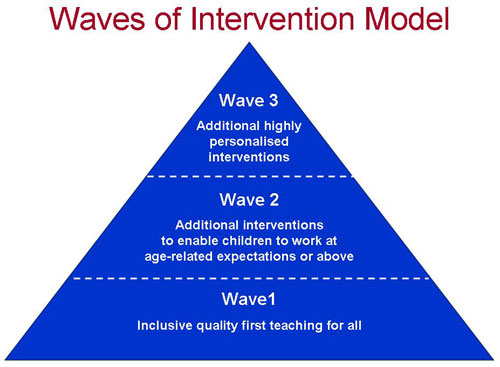Waves of Intervention
The school provides a graduated response to each child dependent on their level of need. This approach is often referred to as the waves of intervention model which is shown below.

When children have been identified as needing further intervention the SENCO will carry out observation and assessments, combined with discussions with parents and outside agencies where appropriate.
Waves of intervention for children with social, emotional and mental health needs:
|
Wave 1 intervention
Whole School Approach (Quality First Teaching)
|
Wave 2 interventions
Targeted Support
For individuals or small groups
|
Wave 3 interventions
Highly personalised intervention for individuals
|
|
Includes:
The effective inclusion of all pupils in high-quality everyday personalised teaching.
Clear objectives that are shared with the children and returned to at the end of the lesson.
Careful explanation of new vocabulary.
Use of lively, interactive teaching styles which make maximum use of visual and kinaesthetic as well as auditory / verbal learning.
Access to pastoral support.
Small group activities to address needs.
Opportunities for children to meet a trusted adult to talk about any fears, confusion and any other emotions.
Emotional checkins
Access to the soft room
Circle times.
|
Dependant on assessed need the following small group interventions may be provided:
Social skills groups
Careful attention to grouping children to ensure positive outcomes and avoid clashes.
Regular additional support from a learning mentor to support children’s social, emotional and mental health needs.
Behaviour logs/ charts.
ELSA
Parent discussion with pastoral team.
Home / school communication books.
Time out cards.
Nurture group.
|
Dependant on assessed need the following individual interventions may be provided:
Social stories.
Specific interventions outlines by MABS (Multi Agency Behaviour Service) and or CAMHS (Child and Adolescent Mental Health Service)
A SEN Support Plan which sets personal targets reviewed on a regular basis
An Individual Behaviour Plan which outlines the proactive and reactive interventions used in school and considers the risks for the child, other children and adults involved
Support from a Teaching Assistant at points throughout the day.
The provision of a work station and aspects of the TEACH approach
Regular additional 1:1 support from a learning mentor
Regular sessions within our Nurture group for children with identified attachment difficulties.
Regular sessions and support from our loss and bereavement support worker where appropriate.
Compleation of an Early Help assessment.
|